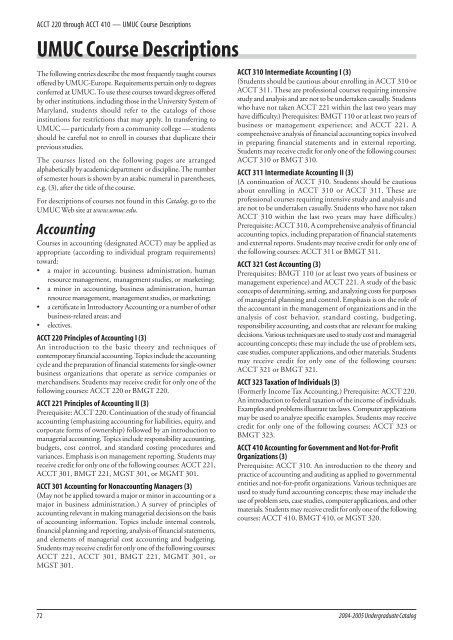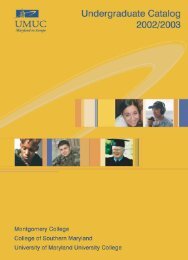Statements of Policy - UMUC Europe
Statements of Policy - UMUC Europe
Statements of Policy - UMUC Europe
You also want an ePaper? Increase the reach of your titles
YUMPU automatically turns print PDFs into web optimized ePapers that Google loves.
ACCT 220 through ACCT 410 — <strong>UMUC</strong> Course Descriptions<br />
<strong>UMUC</strong> Course Descriptions<br />
The following entries describe the most frequently taught courses<br />
<strong>of</strong>fered by <strong>UMUC</strong>-<strong>Europe</strong>. Requirements pertain only to degrees<br />
conferred at <strong>UMUC</strong>. To use these courses toward degrees <strong>of</strong>fered<br />
by other institutions, including those in the University System <strong>of</strong><br />
Maryland, students should refer to the catalogs <strong>of</strong> those<br />
institutions for restrictions that may apply. In transferring to<br />
<strong>UMUC</strong> — particularly from a community college — students<br />
should be careful not to enroll in courses that duplicate their<br />
previous studies.<br />
The courses listed on the following pages are arranged<br />
alphabetically by academic department or discipline. The number<br />
<strong>of</strong> semester hours is shown by an arabic numeral in parentheses,<br />
e.g. (3), after the title <strong>of</strong> the course.<br />
For descriptions <strong>of</strong> courses not found in this Catalog, go to the<br />
<strong>UMUC</strong> Web site at www.umuc.edu.<br />
Accounting<br />
Courses in accounting (designated ACCT) may be applied as<br />
appropriate (according to individual program requirements)<br />
toward:<br />
• a major in accounting, business administration, human<br />
resource management, management studies, or marketing;<br />
• a minor in accounting, business administration, human<br />
resource management, management studies, or marketing;<br />
• a certificate in Introductory Accounting or a number <strong>of</strong> other<br />
business-related areas; and<br />
• electives.<br />
ACCT 220 Principles <strong>of</strong> Accounting I (3)<br />
An introduction to the basic theory and techniques <strong>of</strong><br />
contemporary financial accounting. Topics include the accounting<br />
cycle and the preparation <strong>of</strong> financial statements for single-owner<br />
business organizations that operate as service companies or<br />
merchandisers. Students may receive credit for only one <strong>of</strong> the<br />
following courses: ACCT 220 or BMGT 220.<br />
ACCT 221 Principles <strong>of</strong> Accounting II (3)<br />
Prerequisite: ACCT 220. Continuation <strong>of</strong> the study <strong>of</strong> financial<br />
accounting (emphasizing accounting for liabilities, equity, and<br />
corporate forms <strong>of</strong> ownership) followed by an introduction to<br />
managerial accounting. Topics include responsibility accounting,<br />
budgets, cost control, and standard costing procedures and<br />
variances. Emphasis is on management reporting. Students may<br />
receive credit for only one <strong>of</strong> the following courses: ACCT 221,<br />
ACCT 301, BMGT 221, MGST 301, or MGMT 301.<br />
ACCT 301 Accounting for Nonaccounting Managers (3)<br />
(May not be applied toward a major or minor in accounting or a<br />
major in business administration.) A survey <strong>of</strong> principles <strong>of</strong><br />
accounting relevant in making managerial decisions on the basis<br />
<strong>of</strong> accounting information. Topics include internal controls,<br />
financial planning and reporting, analysis <strong>of</strong> financial statements,<br />
and elements <strong>of</strong> managerial cost accounting and budgeting.<br />
Students may receive credit for only one <strong>of</strong> the following courses:<br />
ACCT 221, ACCT 301, BMGT 221, MGMT 301, or<br />
MGST 301.<br />
72<br />
ACCT 310 Intermediate Accounting I (3)<br />
(Students should be cautious about enrolling in ACCT 310 or<br />
ACCT 311. These are pr<strong>of</strong>essional courses requiring intensive<br />
study and analysis and are not to be undertaken casually. Students<br />
who have not taken ACCT 221 within the last two years may<br />
have difficulty.) Prerequisites: BMGT 110 or at least two years <strong>of</strong><br />
business or management experience; and ACCT 221. A<br />
comprehensive analysis <strong>of</strong> financial accounting topics involved<br />
in preparing financial statements and in external reporting.<br />
Students may receive credit for only one <strong>of</strong> the following courses:<br />
ACCT 310 or BMGT 310.<br />
ACCT 311 Intermediate Accounting II (3)<br />
(A continuation <strong>of</strong> ACCT 310. Students should be cautious<br />
about enrolling in ACCT 310 or ACCT 311. These are<br />
pr<strong>of</strong>essional courses requiring intensive study and analysis and<br />
are not to be undertaken casually. Students who have not taken<br />
ACCT 310 within the last two years may have difficulty.)<br />
Prerequisite: ACCT 310. A comprehensive analysis <strong>of</strong> financial<br />
accounting topics, including preparation <strong>of</strong> financial statements<br />
and external reports. Students may receive credit for only one <strong>of</strong><br />
the following courses: ACCT 311 or BMGT 311.<br />
ACCT 321 Cost Accounting (3)<br />
Prerequisites: BMGT 110 (or at least two years <strong>of</strong> business or<br />
management experience) and ACCT 221. A study <strong>of</strong> the basic<br />
concepts <strong>of</strong> determining, setting, and analyzing costs for purposes<br />
<strong>of</strong> managerial planning and control. Emphasis is on the role <strong>of</strong><br />
the accountant in the management <strong>of</strong> organizations and in the<br />
analysis <strong>of</strong> cost behavior, standard costing, budgeting,<br />
responsibility accounting, and costs that are relevant for making<br />
decisions. Various techniques are used to study cost and managerial<br />
accounting concepts; these may include the use <strong>of</strong> problem sets,<br />
case studies, computer applications, and other materials. Students<br />
may receive credit for only one <strong>of</strong> the following courses:<br />
ACCT 321 or BMGT 321.<br />
ACCT 323 Taxation <strong>of</strong> Individuals (3)<br />
(Formerly Income Tax Accounting.) Prerequisite: ACCT 220.<br />
An introduction to federal taxation <strong>of</strong> the income <strong>of</strong> individuals.<br />
Examples and problems illustrate tax laws. Computer applications<br />
may be used to analyze specific examples. Students may receive<br />
credit for only one <strong>of</strong> the following courses: ACCT 323 or<br />
BMGT 323.<br />
ACCT 410 Accounting for Government and Not-for-Pr<strong>of</strong>it<br />
Organizations (3)<br />
Prerequisite: ACCT 310. An introduction to the theory and<br />
practice <strong>of</strong> accounting and auditing as applied to governmental<br />
entities and not-for-pr<strong>of</strong>it organizations. Various techniques are<br />
used to study fund accounting concepts; these may include the<br />
use <strong>of</strong> problem sets, case studies, computer applications, and other<br />
materials. Students may receive credit for only one <strong>of</strong> the following<br />
courses: ACCT 410, BMGT 410, or MGST 320.<br />
2004-2005 Undergraduate Catalog






